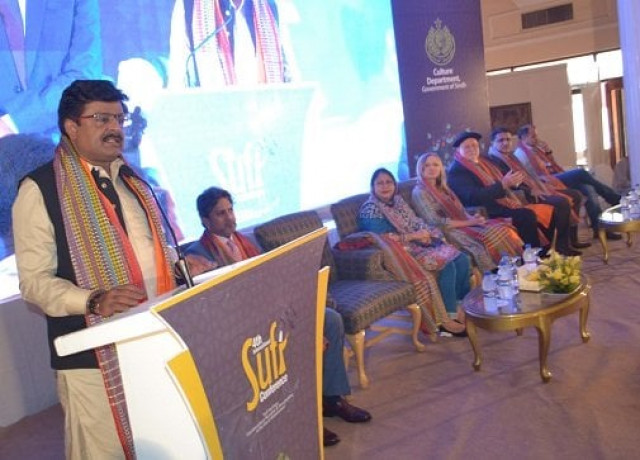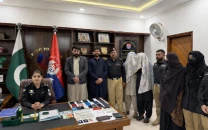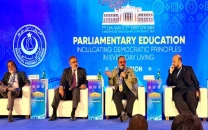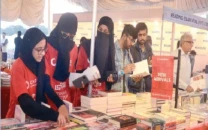'Sufi narrative needs to be transferred to the new generation'
Fourth International Sufi Conference inaugurated at Beach Luxury Hotel

PHOTO: ATHAR KHAN/ EXPRESS
The chief guest, MNA Faryal Talpur, said that sufism, as an antidote to right wing extremism and hate ideologies, can play a crucial role if cultural secularisation and gaps are bridged with peace, love, tolerance, equality and respect for all - which is what sufism preaches.
"We have to transfer the secular sufi narrative and knowledge to the new generation to counter intolerance and extremism," Talpur said.
The cultural heritage and intellectual legacy of sufism left by the great mystic poets and sages from the East to West bear witness to the cosmopolitan humanistic values of tolerance, equality, interfaith harmony, human freedom and peaceful coexistence, she said, adding that Sindh is known as the 'land of sufis and peace'.
Sufi teachings can eliminate extremism: speaker
"Globally and locally, these are troubled times as extremism of all forms is at its worst. After economic inequality, social and religious intolerance throughout world, and mainly in the Muslim world, have posed a threat that can only be countered through sufism," said Culture Minister Sardar Ali Shah.
The first paper, 'Dying before death on the path of Tassawuf', written by Prof Dr Van Hugh Skyhawk, was about travelers on the path of tassawuf. He argued that through ishq, love of Allah, the sufi kills all within themselves that is not Allah. The sufi's 'khudi' merges with the will of 'khuda', which is Allah. Thus, they die before his death. Furthermore, Dr Skyhawk said that 'friends of God do not die'.
The second paper, 'Khuwaja Ghulam Farid's Metaphysical Principle of Unity in Diversity and its Sufitic Role in the Era of Globalisation', was written by Dr Shahzad Qaisar. He spoke about the metaphysical concept of the absolute, the infinite and the metaphysical whole that leaves no possibility of otherness. According to him, a certain level of knowledge corresponds with a certain level of being. He argued that Khuwaja Ghulam Farid was deeply influenced by the metaphysical tradition of Mansur Halaj, Bayazid Bistami, Ibn Arabi and Khuwaja Ghulam Fakharuddin.
'Sufis first bring people closer to their hearts, then to humanity'
The third paper was presented by Dr Zulfiqar Ali Kalhoro from the Pakistan Institute of Development Economics in Islamabad. Focusing on 'Mianwal Tariqa of Kalhoras: Rituals and Practices', his paper discussed the religio-political history of the Kalhoras and the important rituals and practices which were very unique to the Mianwal Tariqa of the Kalhoras.
The fourth paper, 'Words Across the Borders: Amir Khusro and the Sufi Legacy in 21st century India', was presented by Prof Kamila Junik-Luniewska. She focused on a brief analysis of the syncretic culture of North India with a special focus on the works of Amir Khusro and examined his concept of sufism against the background of the development of sufi orders in India.
During the second session, 'Sufism, Transculturalism and Plurality', six speakers spoke. Dr Bokhtar Bakozada from Tajikistan presented his paper, 'Behind the veil of language - from philosophy of languages towards Rumi's mystical poetry'. Lena Fedorova of Russia spoke about the idea of Johar and Zikr Jahri, while Prof Enrique from Spain presented his paper about 'Rituals, health and interreligious coexistence - sonorous and kinetic expressions of members of Moroccon fraternities'.
Controversial cleric Maulana Sufi Muhammad released on bail
During the third session, three research papers were presented on sufism and gender by scholars Sheeba Arif, Umbreen Soomro and Naila Pervaiz, who were from Turkey, Jamshoro and Lahore respectively.



















COMMENTS
Comments are moderated and generally will be posted if they are on-topic and not abusive.
For more information, please see our Comments FAQ